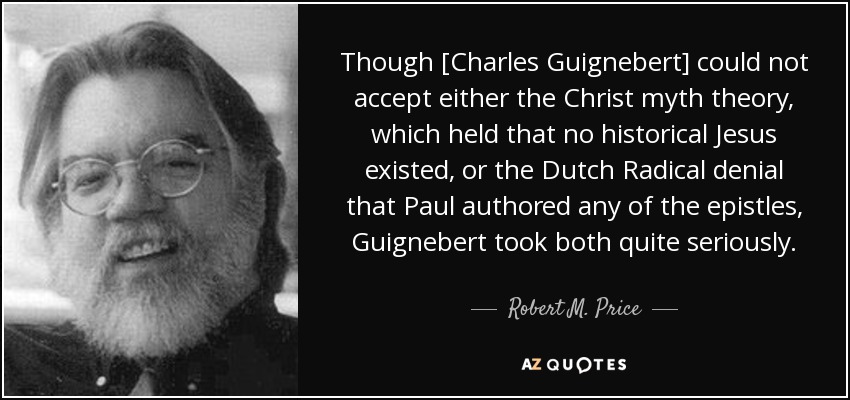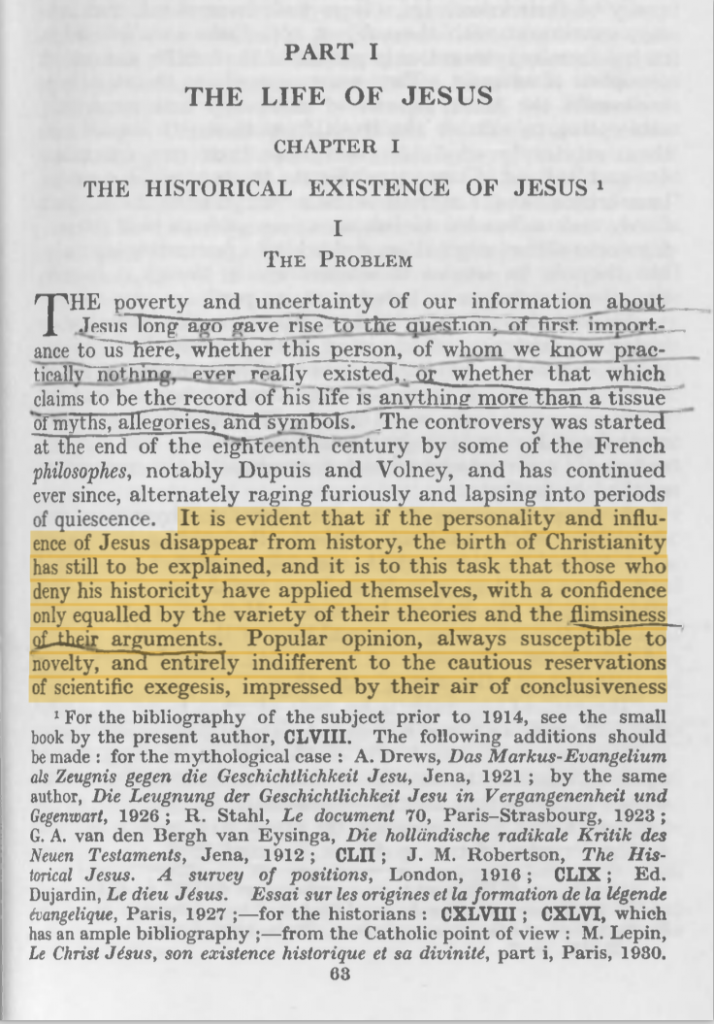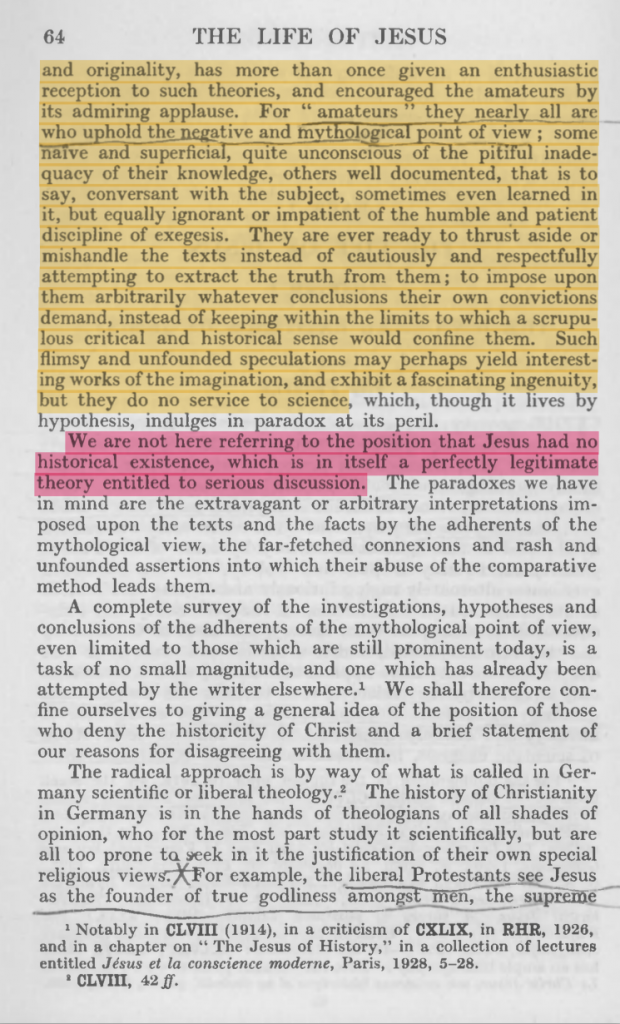Back in June I noticed the following blog post by a certain professor of New Testament studies and “progressive Christian” but being overseas and away from my little library I was unable to check the details and respond at the time…..
The post begins with a quotation of a Facebook post by Ron Huggins directed to James McGrath personally:
The French scholar Charles Guignebert, Professor of Christian History at the Sorbonne in Paris, wrote a very critical book on Jesus in the 1950s. He was far more skeptical of the value of historical data on Jesus than most New Testament scholars liberal or conservative would be today. . . .
(James McGrath knowing how much you love the mythicists, I thought you might appreciate this quotation)
. . . .[A]s skeptical as Guignebert was of the New Testament evidence, he was even more skeptical of the fanciful reconstructions of the Mythicists (historical Jesus deniers). I don’t think I’ve ever run across a better summing up of why scholars as a whole tend to reject the theories of the Mythicists . . . .
James McGrath loved the quote and even placed it against another quote by Christ Myth scholar Robert M. Price to make it appear that Price was ignorantly claiming some small support from Guignebert without any justification.
Well, I’ve returned home now and had a chance to check my Guignebert and was both surprised and not surprised to find that the Huggins-McGrath quotation just happened to stop short of a sentence that backfired on what they were claiming the quote said about “mythicism”. Here are the words of Guignebert selected by Huggins and McGrath to make their case:
“It is evident that if the personality and influence of Jesus disappeared from history, the birth of Christianity has still to be explained, and it is to this task that those who deny his historicity have applied themselves, with a confidence only equaled by the variety of their theories and the flimsiness of their arguments. Popular opinion, always susceptible to novelty, and entirely indifferent to the cautious reservations of scientific exegesis, impressed by their air of conclusiveness [64] and originality, has more than once given an enthusiastic reception to such theories, and encourage the amateurs by its admiring applause. For “amateurs” they nearly all are who uphold the negative and mythological point of view; some naïve and superficial, quite unconscious of the pitiful inadequacy of their knowledge, others well documented, that is to say, conversant with the subject, sometimes even learned in it, but equally ignorant or impatient of the humble and patient discipline of exegesis. They are ever ready to thrust aside or mishandle the texts instead of cautiously and respectfully attempting to extract truth from them; to impose upon them whatever conclusions their own convictions demand, instead of keeping within the limits to which a scrupulously critical and historical sense would confine them. Such flimsy and unfounded speculations may perhaps yield interesting works of the imagination, and exhibit a fascinating ingenuity, but they do no service to science.”
That quote finishes mid-sentence. “Science” is not the last word of the sentence. It appears, furthermore, that both Huggins and McGrath were interrupted before they could read the very next sentence which I quote here:
We are not here referring to the position that Jesus had no historical existence, which is in itself a perfectly legitimate theory entitled to serious discussion.
So when the “Religion Prof” (as the author calls himself) set up the Guignebert quotation against Robert M. Price as he did….
Compare that quote with how Robert Price apparently spoke of Guignebert’s perspective:

The Religion Prof asks his readers to compare the selected words of Guignebert with those of Robert M. Price, and they do make Price look a bit foolish, dishonest even.
But Guignebert’s very next sentence after the words selected for quotation actually belie the claim by both Huggins and McGrath and substantiate the quote by Price. Price said Guignebert took the hypothesis seriously and we see that Guignebert indeed used the words “entitled to serious discussion”.
Guignebert was critical of what since Sandmel is labelled uncontrolled “parallelomania”, a fault that too often accompanied the “history of religions” school at that time and that some mythicists fall into today.
I know you are getting all of this second hand and you can’t check for yourselves what Guignebert wrote, so I have scanned the relevant pages and attach them below. (Excuse the wobbly underlining — thanks to that underlining I was able to purchase my copy at little expense.)
If you enjoyed this post, please consider donating to Vridar. Thanks!



The Guignebert book is now on my must-get list.
I have posted a few times on thoughts of Guigenbert: See the Guignebert archive. I seem to recall Guignebert being less than professional with some of his comments, even anticipating some of the worst we see among a few scholars today, and was actually looking for that reference when I discovered how shoddy the Huggins-McGrath selected quote really was.
I hope someone brings this post to the attention of both H and M and if they do also let me know their responses. No doubt they will retract with an apology, especially M to Price.
I think that the word ‘carelessness’ in the post title may be a bit euphemistic.
1) La critique radicale des témoignages traditionnels, touchant l’existence de Jésus, s’appuie sur deux arguments principaux, renouvelés de Bruno Bauer : 1° la littérature contemporaine de Jésus, en dehors des écrits chrétiens, ne nous dit absolumnent rien de lui. 2° La littérature néotestamentaire, avec ses discordances et ses contradictions, ses interpolations évidentes, ses invraisemblances énormes, ne peut être considérée comme une source historique digne de confiance. [Guignebert, Charles (1913). “Le Problème de L’Existence de Jésus”. ‘La Grande revue’. 79. p. 173.]
2) Confessons donc que tous les prétendus témoignages païens et juifs ne nous apportent aucun renseignement utile sur la vie de Jésus, qu’ils ne nous donnent même pas la certitude qu’il ait vécu. [Charles Guignebert (1933). “Jésus”. ‘La Renaissance du Livre’. p. 23.]
Very interesting article.
I would add also that the Mythicist Louis Gordon Rylands was so indebted to prof Guignebert that he cites him as an authority continually about gnosticism.
It is good to see a so mutual respect among historicists and mythicists, but it seems an utopy today.
I don’t know Huggins, but McGrath has proven himself to be maliciously dishonest. To take a quote out of context is classic Christian behavior.
Christ mythicism is nothing but a “huh” issue, only deeply troubling to Christians and those who fear them. Those who make a big deal about it, you only have to wonder what they’re afraid of, even to assert that the issue is not even worth of argument. Psychological issues are peaking through, not issues with the theories.
Personally I find the topic interesting, but most Christians I know have dropped arguments about faith entirely to defend their man-God Trump.
“Careless” is awfully charitable at this point. Tim has spent years now documenting that they don’t read the sources, they just circulate cherry picked quotes like this, or, worse, kick around conveniently “careless” misapprehensions of the actual arguments, so that past generations’ voices are lost. It needs to be called by its name: intellectual dishonesty.
It certainly looks like dishonesty. Even if Huggins stopped reading before he reached the end of his final sentence it demonstrates a willfulness to seize upon anything damaging to make their point and for both Huggins and McGrath it testifies to malicious intent. There was clearly no interest in reading Guignebert for a certain understanding of his point. Huggins and McGrath have certainly behaved unprofessionally, and McGrath moreso for using the quote to slander Robert Price as the dishonest quote-miner. Pots and kettles!
I afterwards recalled I have been doing occasional series titled “Biblical Scholar Watch”. I wish I had remembered and used that line before posting the above.
I’ve been planning to write a Vridar page with a collection of mistakes — not the silly ones, but the ones that persist and have an undue effect on scholarly consensus. Perhaps if we catalog them here, honest scholars can use them in future works.
Intellectual dishonesty is also too charitable. Pseudointellectual or malicious dishonesty work better for me.
Lots of problems with Huggins and McGrath. They seem to claim the book was written or first published in the 1950’s. But the author Guignebert died c. 1935. Though some of his works were published posthumously, are they referring to the “Jesus” book originally written and published c. 1933?
Guignebert’s book was first published in French in 1933; its English translation (S. H. Hooke) was copyrighted in 1956 and first printed by University Press 1958.
Please do Tim, it would be beneficial for numerous “honest” scholars out there, and also the interested amateurs amongst us.
I’ve actually forgotten some, only to be reminded while doing research.
I don’t know if you noticed, but someone pointed this out in the comment section, and this was James’ response:
“My understanding is that he is saying what I have often said, namely that the issue is not whether one can legitimately make a case for the non-historicity of Jesus in principle and have it taken seriously, but whether the actual views and arguments being offered by the proponents of Jesus mythicism are substantive or silly. One can in principle make the case that aliens have visited Earth, and deserve to have it taken seriously, but that does not mean that any of the cases thus far offered are at all plausible. In principle we should be open to possibilities, but we may still be justified in finding all the cases made up until now for those possibilities to be quite ridiculous.” (source: http://disq.us/p/1j93cp3)
It’s deeply dishonest to say that aliens and mythical beings are not comparable.
McGrath still owes Price an apology, and certainly a retraction of his misrepresentation.
McGrath has obviously not read Guignebert and is just making up what he would like Guignebert to mean. His analogy is actually a contradiction of what he is trying to say. You don’t take seriously arguments that aliens have landed here on earth at all. But the analogy is apt for McGr’s view of mythicism: he will not allow any explanation to be reasonable, full stop.
It would take me a little while to locate it, but there was one time when McGrath responded to my criticism of a review of on a Doherty chapter by “laughing” and saying that I actually made the mythicist hypothesis sound plausible. Doherty chimed in to alert McGrath to what he had just said and its implications. McGrath’s point, of course, was that he will not accept any possibility that any case for mythicism could in any way be plausible.
When he says in theory it can be, he is saying “in theory there really could be fairies under toadstools in the garden”.
Republicans will not accept any possibility that any case for climate change could in any way be plausible.
McGrath has always painted mythicism with a broad brush, maligning anyone who dares to treat its possibility as a serious option. Remember, the cardinal sin that caused most respectable scholars to shun Vridar was the fact that we provided a platform for mythicists’ ideas. Recall also that McGrath panned Doherty’s second book before he even read it and routinely misstated and misrepresented it when he finally did.
By now nobody should be surprised by his dishonesty and incompetence. It’s his shtick, and it sells.
Honest debate is what you expect from a scholar. Sneering disdain is what you get.
http://www.patheos.com/blogs/religionprof/2010/07/mythicism-intelligent-design-courts-and-sports.html
three mythicists objectively view sources that two “Christians” do not…